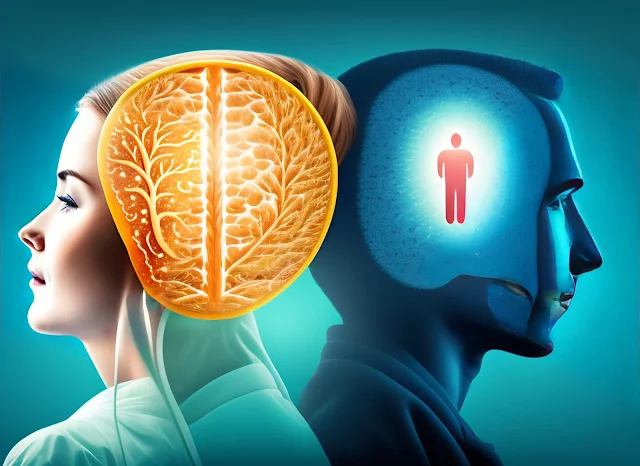Understanding Mental Health: Symptoms, Causes, and Treatment Options
Mental health plays a critical role in our overall well-being, impacting how we think, feel, and behave. Mental health issues can arise from various sources, including genetics, life events, environmental factors, and more. The consequences of mental health problems can range from mild anxiety to major depression and can even impact a person's ability to live a normal life.
It is essential to be aware of the symptoms, causes, and treatment options to support those struggling with mental health issues. In this article, we will provide a comprehensive overview of mental health, covering everything from common symptoms to effective treatment options.
Symptoms of Mental Health Issues
Mental health issues can manifest in various ways, with some of the most common symptoms including:
- Persistent feelings of sadness, hopelessness, and worthlessness
- Irritability, anger, and aggressive behavior
- Changes in appetite, sleep patterns, and energy levels
- Loss of interest in activities that were once enjoyable
- Difficulty concentrating, remembering, and making decisions
- Thoughts of suicide or self-harm
- Feelings of anxiety and panic
It's crucial to understand that these symptoms can vary from person to person and can change over time. Some individuals may experience symptoms for a short period, while others may struggle with mental health problems for an extended period.
Causes of Mental Health Issues
There are various factors that can contribute to mental health problems, including:
- Biological factors, such as genetics, chemical imbalances in the brain, and hormonal changes
- Environmental factors, such as poverty, homelessness, and abuse
- Life events, such as traumatic experiences, the loss of a loved one, or divorce
- Substance abuse, including alcohol and drug use
- Medical conditions, such as a chronic illness or injury
It's essential to note that mental health problems are not caused by personal weakness or a lack of willpower. They are real, treatable medical conditions.
Treatment Options for Mental Health Issues
There are several treatment options available to individuals struggling with mental health problems. The best treatment approach depends on the individual's specific needs and symptoms. Some of the most effective treatments include:
- Psychotherapy: Also known as talk therapy, psychotherapy involves talking to a mental health professional about your thoughts, feelings, and behaviors. It can help individuals better understand and manage their mental health problems.
- Medications: Antidepressant, antipsychotic, and antianxiety medications can help regulate mood, reduce symptoms of mental health problems, and improve the overall quality of life.
- Lifestyle changes: Making changes to your lifestyle, such as exercising regularly, eating a healthy diet, and getting enough sleep, can help improve mental health and reduce symptoms.
- Support groups: Joining a support group can provide individuals with a sense of community and help them connect with others who are also struggling with mental health problems.
- Self-care: Practicing self-care, such as practicing mindfulness, meditation, and deep breathing, can help individuals manage stress and improve their mental well-being.
Recovery from mental health problems is possible with the right treatment and support. Individuals can manage their symptoms, improve their quality of life, and lead fulfilling and productive lives.
Seeking Help for Mental Health Issues
If you or someone you know is struggling with mental health issues, it's important to seek help from a mental health professional. There are many organizations and websites dedicated to providing accurate and up-to-date information on mental health, including the National Alliance on Mental Illness (NAMI), the American Psychological Association (APA), and the National Institute of Mental Health
Mental Health and Workplace Productivity
One of the most significant impacts of mental health problems is the effect it has on workplace productivity. Mental health problems can lead to decreased motivation, poor focus, and decreased overall productivity, leading to decreased performance and decreased earning potential. It is essential for employers to understand the impact of mental health problems in the workplace and take steps to support employees who are struggling with these issues.
Creating a Supportive Work Environment
Creating a supportive work environment is essential in promoting good mental health among employees. Employers can promote good mental health by providing employees with flexible work arrangements, such as flexible hours or remote work options, which can help reduce stress and promote overall well-being. Employers can also provide support for employees by offering on-site counseling services or access to mental health resources, such as employee assistance programs.
Educating Employees on Mental Health
Educating employees on mental health and the importance of good mental health is an essential step in promoting mental well-being in the workplace. Employers can offer workshops and training sessions on mental health and stress management, which can help employees better understand the impact of mental health problems and how to manage stress and promote good mental health.
Accommodating Mental Health Disabilities
Employers have a legal obligation to accommodate employees with mental health disabilities, including providing reasonable accommodations to help employees perform their job duties. Reasonable accommodations may include flexible work hours, time off for medical appointments, and modified job duties. Employers can also provide accommodations such as access to mental health resources, private space to take breaks, or assistance with work-related tasks.
Mental Health Benefits
Employers can also offer mental health benefits, such as mental health coverage, as part of their employee benefits package. This can include coverage for mental health counseling, therapy, and medication, as well as access to mental health resources and support. Providing mental health benefits can help employees access the care they need to manage their mental health and improve their overall well-being.
Managing Mental Health in the Workplace
It is essential for employers to have policies and procedures in place to manage mental health in the workplace. This includes having a clear and open dialogue about mental health and providing support and resources for employees who are struggling with mental health problems. Employers can also provide education and training for managers and supervisors on how to recognize and support employees who are struggling with mental health issues.
In conclusion, promoting good mental health in the workplace is essential in ensuring the well-being and productivity of employees. Employers can promote good mental health by creating a supportive work environment, educating employees on mental health, accommodating mental health disabilities, offering mental health benefits, and managing mental health in the workplace.
You're feeling sluggish and sluggish, and you just can't seem to shake it off.
You've tried everything from exercise to caffeine, but nothing seems to be working. Just when you're about to give up hope, you hear about Natural Stacks, the all-natural supplement company that's taking the world by storm. You're skeptical, but you decide to give it a try anyway. You take your first dose and suddenly, you feel a rush of energy coursing through your veins. You feel invigorated, and you're ready to take on the world. But just as you're about to celebrate your newfound energy, you realize that there's a catch...will taking Natural Stacks have unintended consequences? Find out next time on the thrilling journey to reclaiming your vitality!
Don't wait until it's too late. Take control of your mental health today. Talk to someone, seek professional help, and make a commitment to prioritize your well-being. Your mind and body deserve the best care, so don't hesitate to make a change for the better. Remember, you are not alone.





Join the conversation
What's your favorite way to incorporate healthy habits into your daily routine?